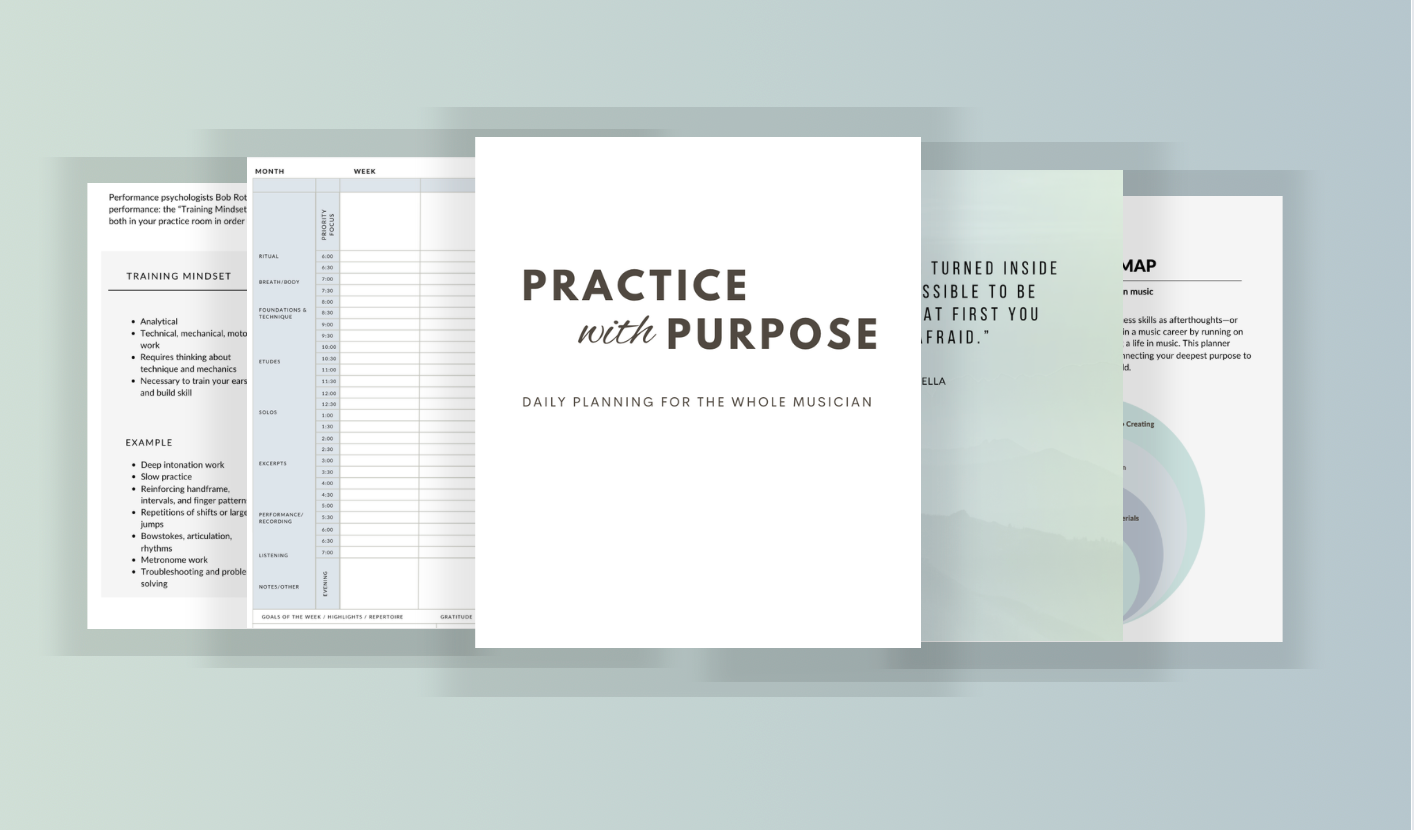Dreams, a Form of Planning: 4 ways to Fuel Your Vision

If you've been with us for a while, you'll know that we love to help you achieve your dreams. Your dream business, dream career, project, idea and life!
You're probably on the road to creating that musical and creative life you dream about. You might be at the beginning of that journey, or you might have traveled a distance already and taken a few detours along the way. You might very well be sitting in the beautiful outcome, designing new goals.
Us too. We'll never stop, and sometimes it's as if we're on different points on the path simultaneously!
If dreams are a form of planning (as wise woman Gloria Steinem said), your aspirations and hopes have a way of coming into being, because the heart doesn't lie. You are an ever-evolving combination of your passions, values and skills:
And when things are aligned, opportunities seem to magically appear, like forks, on-ramps or exits on the highway.
Dreams are ways to drive and inspire us to accomplish things we think are impossible. A vision leads to planning, planning leads to courage, and courage motivates us to explore the unexplored… But dreams without action are just thoughts, and because (say it with us, all together now) "the learning is in the doing", taking action is the only way to keep these dreams from sitting on the “daydream shelf” collecting dust!
Here are 4 “dream fuel” lessons to keep your vision from being just that… merely a dream!
1 - ROUTINES HELP YOU STAY CONSISTENT
Benjamin Franklin shared his daily routine in his autobiography. Known for his discoveries about electricity, he was also a writer, philosopher, scientist, politician, inventor, and publisher and helped with the founding of the United States of America. Here's his daily routine, as published in his book:

It's so inspiring in its simplicity! When it comes to achieving long term (or heck, short term) goals, consistency is arguably the most important ingredient. And setting up a ritual or routine helps you with that consistency. A routine:
#1: Makes it easier to follow through on the bigger behavior toward achieving your goals
#2: Creates consistency and automation for the habits you want to build into your life
#3: Removes the need to make a decision
#4: Avoids wasting time and energy
#5: Removes the how of getting started helps during times of stress or unpredictability
Ok, that's pretty convincing! But, how do I go about making one, you ask?! According to the Merriam-Webster dictionary a ritual is "an act or series of acts regularly repeated in a set precise manner". Almost ceremonial, its sequence of actions helps set up an upcoming event. A routine is similar, with the difference being that they are most often attributed to actions that just need to be done—such as making your bed or taking a shower). Rituals are generally more meaningful practices that have more of a sense of purpose.
Here are some elements you can consider when creating one. And remember, it doesn't have to be lengthy or complicated:
-
Environment:
-
How is it organized?
-
Do you have your space laid out a certain way?
-
Do you like to light a candle?
-
Have a glass of water?
-
Turn off your phone? Will you allow your phone in your practice room?
-
-
Intention:
-
What would you like to infuse in the ritual?
-
Positive energy, productive vibes, a certain mindset?
-
-
Presence:
-
How will you be fully present for the ritual?
-
-
Aspiration:
-
What do you want to create?
-
Who do you want to be?
-
How do you want to contribute to the world?
-
How do you want to show up and serve?
-
-
Appreciation:
-
What are you grateful for? For example, you can be grateful for they body you are using to play your instrument.
-
Cello legend Pablo Casals played Bach as a benediction on the house each morning before his practice. The simpler and more meaningful, the better :) Pouring yourself a cup of tea, or clearing your desk, could be a ritual.
So, what's yours going to be?
2 - TURBULENCE IS NORMAL
It's never just smooth sailing! We all know this intellectually, but in real life we still think it all will be! Sports performance coach Justin Su'a told a story:
Years ago I sat next to an airline pilot who taught me a lot about turbulence. He said: "Turbulence is completely normal. Sometimes we can see it coming and avoid it to not scare the passengers and sometimes it just comes out of nowhere. Either way, it might be a horrible experience but it's not as bad as many passengers think. It might feel like the plane is going to fall apart, but these planes are built for that kind of stuff. The best thing to do when we experience turbulence is to just keep flying."
The same principles hold true for experiencing turbulence in life. While you would love for your journey to be smooth sailing, the reality is that turbulent times are completely normal: slumps happen, losing streaks occur and failure is constant. Sometimes you can see adversity coming from a mile away as a result of poor decisions you've made, and sometimes it happens as a result of something completely out of your control. Like planes, you were also built to withstand tough times, and as such, instead of pressing the panic button when you are experiencing turbulence in your life - remember your final destination and keep flying."
You too were built to withstand a lot. Keep flying!
3 - KEEP AN ABUNDANCE MINDSET
According to cognitive science, thoughts are mental representations of information that help you make sense of the world. They're energy too: just recall any thought that triggered a strong emotional reaction. As spiritual teacher Wayne Dyer says, " Thoughts are mental currency that you use to attract what you desire. Learn to stop spending that currency on thoughts you don’t want. Your body might continue, for a while, to stay where it’s been trained to be, but meanwhile, your thoughts are being aligned with your dreams. Align your inner creative energy—your thoughts—so that they match up perfectly with your desires. Dream and you shall become."
In his book “The Seven Habits of Highly Effective People.” Stephen Covey coined the terms abundance and scarcity mindsets. In it, he likens abundance to optimism and scarcity to pessimism. But it goes beyond that. Here are a few ways you can cultivate the abundance attitude:
- See failure as opportunity
- Be proactive instead of reactive
- Don't view life as a competition
- Hang with good people who have an abundance mindset
- Find and create win-win situations
- Train your mind to recognize possibilities
- Cultivate gratitude
4 - THE LITTLE THINGS MAKE ALL THE DIFFERENCE
Stack little wins. Keep making plays. Watch this Deion Sanders video for a boost!
At the first practice of each season, legendary coach John Wooden taught his players how to put on their socks and shoes a very particular way. When asked about this, he replied, "The little things matter. All I need is one little wrinkle in one sock to put a blister on one foot--and it could ruin my whole season. I started teaching about shoes and socks early in my career, and I saw that it really did cut down on blisters during the season. That little detail gave us an edge." Coach Wooden knew the long-term impact of "little things done well."
The authors of The Power of Small, Linda Kaplan Thaler and Robin Koval, say our smallest actions and gestures often have outsized impact on our biggest goals.
And James Clear devotes most of his book Atomic Habits to presenting the power of 1% improvements over time. He says, "Your life today is essentially the sum of your habits. How in shape or out of shape you are? A result of your habits. How happy or unhappy you are? A result of your habits. How successful or unsuccessful you are? A result of your habits. What you repeatedly do ultimately forms the person you are, the things you believe, and the results you enjoy. It is so easy to overestimate the importance of one defining moment and underestimate the value of making better decisions on a daily basis. The daily choices we make shape our teams, our societies, and ourselves. Change your habits and you’ll change your life."



